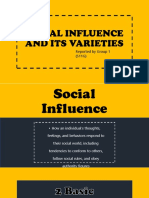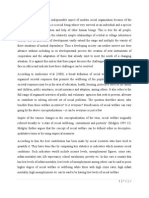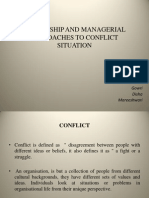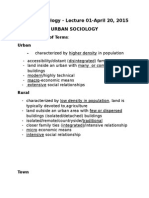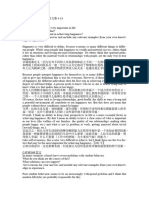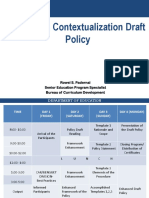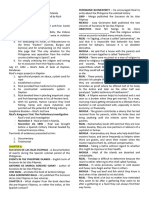Model Answer Social Loafing.
Model Answer Social Loafing.
Uploaded by
niallc101Copyright:
Available Formats
Model Answer Social Loafing.
Model Answer Social Loafing.
Uploaded by
niallc101Original Description:
Copyright
Available Formats
Share this document
Did you find this document useful?
Is this content inappropriate?
Copyright:
Available Formats
Model Answer Social Loafing.
Model Answer Social Loafing.
Uploaded by
niallc101Copyright:
Available Formats
With reference to either social loafing or groupthink, discuss how groups in the workplace can be source of negative synergy.
Identify and discuss two ways in which such potential disadvantages of group working might be addressed.
Social Loafing can be defined as the tendency of an individual in a group activity to make less of an effort compared to the effort given in individual work; as more members are in a group individuals tend to contribute less as they are not solely responsible for the outcome of the work. Throughout this essay I will attempt to discuss the causes and effects of negative synergy and how these causes can be resolved. Firstly, synergy can be described as the creation of a whole that is greater than the sum of its parts, so therefore negative synergy is when two or more individuals come together and the sum is actually lower producing Social Loafing. A main cause of negative synergy due to Social Loafing is an individuals expectations of the other members of a group. Whether it is consciously or unconsciously individuals will expect others to make less of an effort, and as a result of this, individuals begin to believe if others arent working hard, then neither should I it is not fair I do more work for them to also reap the rewards. An example of this may be in a school presentation project; if one member isnt giving much input this may cause others to become irritated that they will also gain the same grade as the person doing all of the work regardless of their input and as a result the presentation will either not be done or rushed at last minute if a solution is found. This effect of people working less hard as a result of perceiving others as doing the same is called the Sucker Effect. The solution to this problem is simply reducing this negative perception of the others in the group. This can be done by increasing communication between its members. By setting tasks for each member to do and breaking down a project into different tasks and delegating work to each member will allow the progress and input of each member to be easily analysed. This can reduce the sucker effect as everybody knows their roles and by communicating on the progress of each task the negative perceptions can be decreased. A second cause of negative synergy is Anonymity; this is where the larger a group becomes the more anonymous an individual feels within the group. When working in large groups blame and glory
are both evenly spread, no one individual will stand out from the crowd, if your group receives
100% in a project you all will, if you receive 0% you all will no matter how much individual effort you have inputted. If an individual feels anonymous within a group they may feel left out, to intimidated to speak up or may even attempt to do as much of the work themselves in order to gain a good mark for the group without anybody elses input. A solution to this problem could be Group Importance increase the relationships and bonds within the group in order to reduce the anonymity of individuals. A study was carried out by Worchel S which included two groups and their goal was to build as many paper chains as they could in a specific time period. Group A were given name tags, a sense of competition and matching coats, whilst group B were given none of these. This resulted in Group A producing five more paper chains that Group B, showing that the stronger relationship and sense of forming an actual team increased output and effort.
In addition, having No standards set in the group will give them no clear ideal to aim for. If there is no expectation set the group may simply do a basic piece of work rather than the complex high standard piece they should be creating. For example, if a piece of work in a classroom will not be assessed and is simply for the benefit of the groups own personal learning they may not work as hard in comparison to a piece of assessed work that counts towards a final grade as they know there will be a negative outcome if they fail. A solution could be increasing the Task Importance. Studies have shown that when people think the task is more important they do less loafing and the groups individuals will speak up and make themselves heard if they believe the relevance of a task is high. An example of increasing the task importance could be creating a competitive environment; i.e. tell the groups they are working against each other for a reward competition builds importance. For example, telling a classroom split into groups and explaining that the winning group in the project will receive no homework the next week will cause the group to be motivated into working harder and being rewarded. In conclusion, It is important to note that not all group work will result in loafing, if the task is challenging or meaningful people will tend to work harder to accomplish the goal.
Diagram illustrating how the number of people in a group actually decreasing the performance of an individual.
You might also like
- GO Ms No-86Document31 pagesGO Ms No-86anikenskyywalker100% (6)
- Kasapreko PLC Prospectus November 2023Document189 pagesKasapreko PLC Prospectus November 2023kofiatisu0000No ratings yet
- Social Influence and Its VarietiesDocument15 pagesSocial Influence and Its VarietiesYeda Cruz100% (1)
- Primary SocializationDocument16 pagesPrimary SocializationJoy CruzNo ratings yet
- Sociology EssayDocument3 pagesSociology EssayLarissa BishopNo ratings yet
- Social LoafingDocument19 pagesSocial LoafingKurnia AgungNo ratings yet
- Unit 9 Education and Social ProcessDocument3 pagesUnit 9 Education and Social ProcessMuhammad Sami UllahNo ratings yet
- Assignment On Theories of EmotionDocument8 pagesAssignment On Theories of EmotionAhmad A. ArabiNo ratings yet
- Mgt321 Chapter 10 - Stress - 2Document26 pagesMgt321 Chapter 10 - Stress - 2Karmila100% (1)
- Psychology Unit - 1-Concept and Goal of PsychologyDocument22 pagesPsychology Unit - 1-Concept and Goal of PsychologySatish Kumar RanjanNo ratings yet
- Social StructureDocument24 pagesSocial StructureHamid SultanNo ratings yet
- Organizational Behaviour (8 L) : Administrative Theory, Theory of Bureaucracy, Human Relations Theory (Elton Mayo)Document23 pagesOrganizational Behaviour (8 L) : Administrative Theory, Theory of Bureaucracy, Human Relations Theory (Elton Mayo)rohitimaginativeNo ratings yet
- Social Science-Course OutlineDocument6 pagesSocial Science-Course Outlinekenha2000No ratings yet
- Health Psychology ModuleDocument76 pagesHealth Psychology ModuleMahad AliNo ratings yet
- Social ChangeDocument10 pagesSocial Changewawa100% (1)
- SocializationDocument2 pagesSocializationkedarNo ratings yet
- What Is Gestalt TherapyDocument5 pagesWhat Is Gestalt TherapyMelat Assegid100% (1)
- Social Change and Real Life ExamplesDocument16 pagesSocial Change and Real Life Examplesmaria_me100% (1)
- Group CohesionDocument25 pagesGroup CohesionChintan SolankiNo ratings yet
- Peace and Conflict Resolution FDocument1 pagePeace and Conflict Resolution FAdnan PirbhaiNo ratings yet
- Group 3 (Remedies of Structural Violence)Document16 pagesGroup 3 (Remedies of Structural Violence)Urooj ZafarNo ratings yet
- How To Maintain AttitudesDocument4 pagesHow To Maintain AttitudesMuzamil0% (1)
- Theories of Social ChangeDocument3 pagesTheories of Social ChangeHemantVermaNo ratings yet
- 4.1 Social InteractionDocument20 pages4.1 Social Interactionsabahat saeed100% (1)
- Sociology and Common SenseDocument1 pageSociology and Common SenseSAMADHAN KAKADE100% (1)
- Ethnomethodology: Aima Idrees MS1 Semester 2 Department of Mass Communication Lahore College For Women University LahoreDocument12 pagesEthnomethodology: Aima Idrees MS1 Semester 2 Department of Mass Communication Lahore College For Women University LahoreLishu ShaikNo ratings yet
- Historical Perspectives On Behavioural ModificationDocument5 pagesHistorical Perspectives On Behavioural ModificationVidhya SriNo ratings yet
- Presentation MotivationDocument17 pagesPresentation MotivationJazib HassanNo ratings yet
- Sampling TechniquesDocument23 pagesSampling TechniquesanilNo ratings yet
- The Effects of Globalization On CultureDocument5 pagesThe Effects of Globalization On CultureLorelyn CorageNo ratings yet
- BSW 111 - Introducion To Social Welfare Ass 1Document7 pagesBSW 111 - Introducion To Social Welfare Ass 1Evangelist Kabaso Sydney100% (2)
- Education As Factor of Social ChangeDocument2 pagesEducation As Factor of Social Changelaljoel100% (4)
- 3 Major Theories of Sociology - SONNYDocument12 pages3 Major Theories of Sociology - SONNYSonny Boy Sajonia100% (1)
- Theories of Development: Reported By: MC Lien Kirby L. Arellano Billy Jay Betalac DIT-1BDocument16 pagesTheories of Development: Reported By: MC Lien Kirby L. Arellano Billy Jay Betalac DIT-1BJudy Mae LawasNo ratings yet
- Group DynamicsDocument47 pagesGroup DynamicsAnne Atieno Ndolo100% (2)
- Social Psychology Lecture No. 01: Class: (MLT, OTT, RIT, ENG - 1 Semester)Document8 pagesSocial Psychology Lecture No. 01: Class: (MLT, OTT, RIT, ENG - 1 Semester)syed hamzaNo ratings yet
- System TheoryDocument5 pagesSystem TheoryJeanneth CapilitanNo ratings yet
- SOC102 Social InequalityDocument118 pagesSOC102 Social InequalityMarissa Mark100% (2)
- Contoh Proposal RESEARCHDocument9 pagesContoh Proposal RESEARCHNurul Saiedah Shukri33% (3)
- Imagination Is Drawn. This Explains Why Sociology Is More Than A Common Sense Because Sociologist Uses Special Sociological PerspectiveDocument9 pagesImagination Is Drawn. This Explains Why Sociology Is More Than A Common Sense Because Sociologist Uses Special Sociological PerspectiveSherinne Jane CariazoNo ratings yet
- Conflict and ResolutionDocument16 pagesConflict and ResolutiondishaappushajiNo ratings yet
- Human Relations MovementDocument3 pagesHuman Relations MovementRiya PhilipsNo ratings yet
- Counselling in Social WorkDocument13 pagesCounselling in Social Worksamuna chhetriNo ratings yet
- Case Work .Document24 pagesCase Work .Arya KrishnaNo ratings yet
- Reason Why Do We ForgetDocument2 pagesReason Why Do We ForgetAsifa Ibrahim Adebayo100% (1)
- Case Worker Client RelationshipDocument22 pagesCase Worker Client RelationshipAnonymous 7OgCadbGfNo ratings yet
- Inequality, Class and Social StructureDocument24 pagesInequality, Class and Social StructureVladimir Sabarez Linawan100% (1)
- Behavioral Learning TheoryDocument16 pagesBehavioral Learning TheoryMehreen KhanNo ratings yet
- Deviance and Social ControlDocument28 pagesDeviance and Social ControlJyoti Yadav100% (1)
- Urban Sociology Definition of Terms and Urban EcologyDocument31 pagesUrban Sociology Definition of Terms and Urban EcologyCJ OngNo ratings yet
- History of Social WorkDocument44 pagesHistory of Social WorkLenethLestino100% (1)
- Unit 7 - Sociological Perspectives For Health and Social Care - Shankaron's BlogDocument9 pagesUnit 7 - Sociological Perspectives For Health and Social Care - Shankaron's BlogPett PeeveNo ratings yet
- Motivational TheoriesDocument24 pagesMotivational TheoriesalmamunduthmNo ratings yet
- Chapter 3 Conventional Morality and Ethics TheoryDocument35 pagesChapter 3 Conventional Morality and Ethics TheoryTia Nurul AfifahNo ratings yet
- Psychology ProjectDocument7 pagesPsychology Projectsai indiraNo ratings yet
- Social Psychology Short NotesDocument12 pagesSocial Psychology Short NotesBesufikad Shiferaw100% (1)
- Interpersonal SkillsDocument8 pagesInterpersonal Skillshunny861No ratings yet
- Conformity and Social InfluenceDocument4 pagesConformity and Social Influenceअभिनव कृष्णNo ratings yet
- Political Analysis SyllabusDocument238 pagesPolitical Analysis SyllabusdonzianNo ratings yet
- Social Work: BY Melchor E. Orpilla, PHD Instructor Pangasinan State University - Bayambang CampusDocument28 pagesSocial Work: BY Melchor E. Orpilla, PHD Instructor Pangasinan State University - Bayambang CampusTrisha Mae De VeraNo ratings yet
- Educating Through Pandemic: Traditional Classroom Vs Virtual Space - the Education RealmFrom EverandEducating Through Pandemic: Traditional Classroom Vs Virtual Space - the Education RealmNo ratings yet
- Bimodal Hearing: How To Optimize Bimodal Fitting: by René H. Gifford, PHDDocument3 pagesBimodal Hearing: How To Optimize Bimodal Fitting: by René H. Gifford, PHDSeongWon LeeNo ratings yet
- Poin 4 - Landasan Pikiran Dan Kriteria Pengakuan PendapatanDocument2 pagesPoin 4 - Landasan Pikiran Dan Kriteria Pengakuan Pendapatansoul sistNo ratings yet
- Finman Digest OwnDocument5 pagesFinman Digest OwnTooMUCHcandyNo ratings yet
- GROUP 7 RA 7925 and Radio Operator Law REPORT 1Document195 pagesGROUP 7 RA 7925 and Radio Operator Law REPORT 1Jade B. BermasNo ratings yet
- EN8491 WSE Unit-I Question and Answers After EditDocument24 pagesEN8491 WSE Unit-I Question and Answers After EditraguNo ratings yet
- Digital Marketing Online Course BrochureDocument16 pagesDigital Marketing Online Course BrochureProf.Mustansar HussainNo ratings yet
- TABLE 9.4 - Minimum Wage Rates by Region, Province and Sector, Philippines: December 2012Document10 pagesTABLE 9.4 - Minimum Wage Rates by Region, Province and Sector, Philippines: December 2012Omana Thalia AlkuinoNo ratings yet
- 3剑桥真题雅思大作文考官译文打卡(2023 6 21)Document35 pages3剑桥真题雅思大作文考官译文打卡(2023 6 21)z5y9q9gmpmNo ratings yet
- Lydia Wirth: The Nutcracker (Set by Brooklyn Mack and Simone Cuttino)Document4 pagesLydia Wirth: The Nutcracker (Set by Brooklyn Mack and Simone Cuttino)api-525382413No ratings yet
- "The Ayodhya Verdict and Aftermath": Sakaar SrivastavaDocument11 pages"The Ayodhya Verdict and Aftermath": Sakaar SrivastavaAppzNo ratings yet
- CFD Trading AgreementsDocument41 pagesCFD Trading Agreements5srd6bbxcrNo ratings yet
- Brakes QueriesDocument2 pagesBrakes Queriespgp655484No ratings yet
- White Light HealingDocument5 pagesWhite Light HealingMihaita Sprinceana100% (1)
- Memorandum o Razumijevanju 12. 3. 2019 PDFDocument24 pagesMemorandum o Razumijevanju 12. 3. 2019 PDFIvica KristovićNo ratings yet
- Language AttitudesDocument24 pagesLanguage AttitudesMuhammad Arif Al Hakim100% (1)
- County Times: No Pets Left BehindDocument24 pagesCounty Times: No Pets Left BehindSouthern Maryland OnlineNo ratings yet
- "Smart Bus Pass System Using QR Code": Computer Science and EngineeringDocument46 pages"Smart Bus Pass System Using QR Code": Computer Science and EngineeringPallavi Patil80% (5)
- TissuesDocument4 pagesTissuesJaveria ZaidiNo ratings yet
- H.Vocal M. Purna - Diploma Exam Form RedoneDocument2 pagesH.Vocal M. Purna - Diploma Exam Form Redonepurabi palNo ratings yet
- WB Ethiopia Gemstones Training Manual PDFDocument50 pagesWB Ethiopia Gemstones Training Manual PDFRaghava Raju Potturi67% (3)
- AnswerDocument16 pagesAnsweratty. domiciano PagulayanNo ratings yet
- Construction of A Superadobe Dome: Marco Aurelio López-Gómez M de Las Nieves González-GarcíaDocument13 pagesConstruction of A Superadobe Dome: Marco Aurelio López-Gómez M de Las Nieves González-Garcíamarimark77No ratings yet
- Curriculum Contextualualization PolicyDocument64 pagesCurriculum Contextualualization PolicyVanito SwabeNo ratings yet
- The Attraction of KoreaDocument52 pagesThe Attraction of KoreailiniaNo ratings yet
- GEM REVIEWErDocument7 pagesGEM REVIEWErEllen CatleNo ratings yet
- J Potratz ResumeDocument3 pagesJ Potratz Resumeapi-216040679No ratings yet
- Submitted To: - Submitted By:-: Page 1 of 32Document32 pagesSubmitted To: - Submitted By:-: Page 1 of 32Shashank Puri100% (2)
- Review RecountDocument7 pagesReview RecountNatalie GraciaNo ratings yet


